Putin's Trip To Iran Proves Isolation Of Moscow - White House
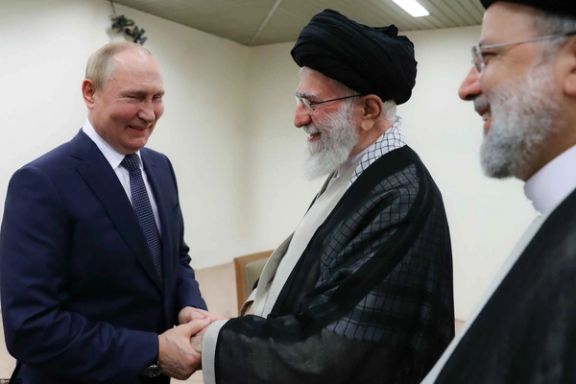
The White House says Russian President Vladimir Putin's trip to Iran on July 19 shows how isolated Moscow has become in the wake of its invasion of Ukraine.

The White House says Russian President Vladimir Putin's trip to Iran on July 19 shows how isolated Moscow has become in the wake of its invasion of Ukraine.
John Kirby, the White House's chief National Security Council spokesman, told reporters on Tuesday, “I would say three things about this trip. One it shows the degree to which Mr. Putin and Russia are increasingly isolated. Now they have to turn to Iran for help.”
“Two, it shows the degree to which his own defense industrial base is having a hard time keeping up with his unprovoked war in Ukraine,” he went on, highlighting Russia’s troubles regarding precision guided munitions and advanced systems, tanks, even aircraft, particularly with the microelectronics due to the sanctions and export controls. He said the pace of operations in Ukraine has also become a challenge.
Kirby said the third thing is Russia “has absolutely no intention of stopping the war” and negotiating a settlement with Ukraine, because he wants to buy several hundred UAVs from Iran “to continue to kill Ukrainians.” Putting prefers to turn to Iran rather than just doing the right thing... and ending the war, he added.
However, Kirby said there is no indication yet that the sale has actually occurred, and that Iran has started training Russian forces to use armed drones, referring to remarks by Jake Sullivan, the US National Security Adviser, who said last week that Tehran planned to supply “several hundred UAVs, including weapons-capable UAVs, on an expedited timeline.”
He said the US is watching the situation closely, as “the Iranians have a domestic production capability of drones and those drones have lethal capabilities. We've seen that for ourselves in the attacks that they have perpetrated in Iraq and in Syria against our own troops and against our own facilities there.”
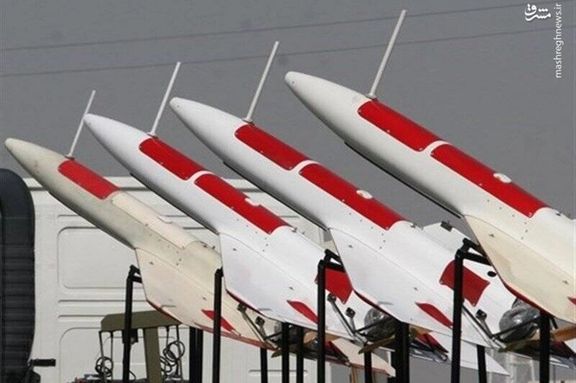
Iran commenting on possible delivery of military drones to Russia said Wednesday that Tehran’s “technical cooperation” with Moscow predates the Ukraine war, .
In his weekly press conference, foreign ministry spokesman Naser Kanaani was asked about reports that Iran might sell military drones to Russia for its war effort in Ukraine, which he did not deny. Instead, he said, “Iranian and Russian technological cooperation predates developments in Ukraine. Any linkage between our cooperation with Russia with developments in Ukraine is intentionally biased.”
He went on to reiterate that Iran pursues “political solutions for this crisis.”
The US National Security Adviser Jake Sullivan recently said that Russian officers visited Iran in June and July to review possible drone purchases.
US Special Envoy for Iran Robert Malley told CNN on Tuesday that any drone shipment from Iran was “of course of concern” and would “bolster Russia’s ability to wreak havoc.” He said it “speaks volumes” that Iran would be in a position where it sold drones to Russia “against its professed position of neutrality in the conflict.” Without giving details, Malley said the US would “use the tools at our disposal” to sanction any supply of weapons to Russia.
Kanaani in his briefing said, however, “Russian and Iranian ties are bilateral, based on the interests of the two countries and do not concern the American government, which cannot comment about the relationship.”
Kanaani also said that he cannot confirm if Ukraine was discussed between presidents Vladimir Putin, Recep Tayyip Erdogan and Iran Ebrahim Raisi when they met in Tehran on Tuesday, although “naturally international issues are discussed in multilateral meetings,” he added.
However, Iran’s Supreme Leader Ali Khamenei in his meeting with Putin clearly backed Russia’s “initiative” in attacking Ukraine, saying that if Moscow had not taken that step, NATO would have started a war anyway.
“Nato is a dangerous creature,” Khamenei said, “[that] didn’t recognize any limits or borders. If you cannot stand up to them in Ukraine, then a little while later, with the excuse of Crimea, they would have started this war anyway,” Khamenei told Putin.
Speaking about Iran’s talks with the United States to restore the 2015 nuclear agreement known as JCPOA, Kanaani rejected US statements that the latest meeting in Doha in June failed. “As a matter of fact, these were good talks,” he insisted.
He went on to speak with optimism that the diplomatic process is well and alive and the European Union is pursuing discussions with the two sides.
Kanaani reiterated Iran’s position that it needs “serious guarantees” about the US commitment to a new agreement and “verification” that Washington carries out its obligations.
Eleven months of talks in Vienna to revive the JCPOA came to a stop in March as Iran demanded the lifting of all sanctions introduced by the US after former President Donald Trump withdrew from the agreement in 2018.
Kanaani also repeated remarks by Khamenei and Raisi on Tuesday that the United States should withdraw its troops from Syria.
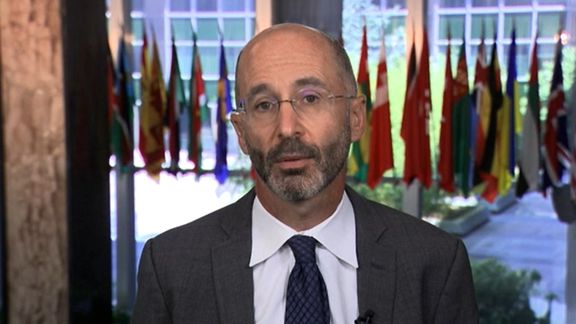
Reacting to Vladimir Putin’s visit to Tehran, US envoy Robert Malley said Tuesday Iran has a stark choice between a nuclear deal or more isolation with Moscow.
In an interview with CNN, Malley, the United States special envoy for Iran, said, “It can opt for a position of relative dependency on Russia, which itself is isolated internationally…or it can choose to come back into the deal that’s been negotiated...and have normal economic relations with its neighborhood and with Europe and the rest of the world.”
The special envoy suggested that not “getting back into the deal” would mean Iran “having to turn to Russia, having to sell on drones to Russia, a choice that is not a particularly attractive one…”
The US recently alleged that Russian officers visited Iran in June and July to review possible drone purchases. Malley said any drone shipment from Iran was “of course of concern” and would “bolster Russia’s ability to wreak havoc.” He said it “speaks volumes” that Iran would be in a position where it sold drones to Russia “against its professed position of neutrality in the conflict.” Without giving details, Malley said the US would “use the tools at our disposal” to sanction any supply of weapons to Russia.
Iran’s supreme leader Ali Khamenei, meeting President Vladimir Putin, gave Tuesday the clearest expression yet of support for Russia over Ukraine, which had “taken the initiative” while “the other side, with its own initiative would have created a war anyway.”
But Russia and Iran have long had some military cooperation, especially supporting President Bashar al-Assad in Syria, during the operation of the 2015 nuclear deal (the JCPOA, Joint Comprehensive Plan of Action) until President Donald Trump withdrew the US in 2018, prompting Iran to begin exceeding JCPOA limits in 2019.
Malley again called Trump’s decision to leave the agreement “catastrophic,” while reiterating that the onus to revive the JCPOA, which has been the subject of year-long negotiations between Iran and world powers, lay in Tehran.
‘A few weeks’
Malley dismissed a suggestion Iran might be responding to US actions, being pushed towards Russia for example not just by US ‘maximum pressure’ but by Biden’s statement during his recent trip to Israel and Saudi Arabia that the US would not leave a regional “vacuum” to be filled by Russia, China, and Iran.
Iran’s leaders have argued with President Joe Biden continuing Trump’s sanctions, has refused as part of JCPOA restoration to lift them all, including listing Iran’s Revolutionary Guards as a ‘foreign terrorist organization,’ and to give assurances it would not impede Iran in benefiting from the agreement.
Malley refused to give a deadline for JCPOA talks.He said Tehran was “a few weeks” from creating enough fissile material for a bomb, “if it chooses to enrich at that level,” although the weaponization “would take longer.”
“Every day” made JCPOA restoration and the return of Iran’s nuclear program to a “safe box” less likely, Malley argued. Terms for reviving the deal had been agreed, he suggested, by all parties in talks other than Iran – including Russia as well as the US, China, France, Germany and the United Kingdom.
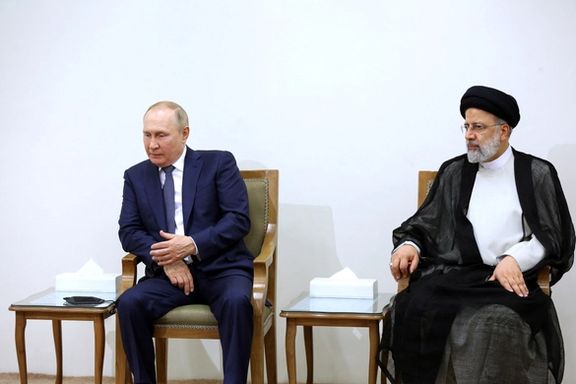
After Iranian leader Ali Khamenei met Russian President Putin Tuesday afternoon, Iran’s main news agency found the two moving closer with the Ukraine crisis.
IRNA headlined its account of the meeting with a call, endorsed by both Khamenei and Putin, for United States forces to be driven out of north-east Syria, “east of the Euphrates [river]…an area rich in oil and agriculture,” where American troops, first deployed in 2015, have remained since 2018 to ‘secure’ Syria’s main oil-fields.
But perhaps a more notable part of IRNA’s report was Khamenei’s clearest expression yet of support for Russian action in Ukraine. While describing war as “brutal and hard,” Iran’s leader suggested that had Russia not “taken the initiative, the other side, with its own initiative would have created a war anyway.”
Iran’s leader cited the 2014 Ukraine “coup” – when protests overthrew Moscow-inclined Ukrainian President Viktor Yanukovich and prompted Russia’s seizure of Crimea – and the expansion of Nato, which has expanded to take in 14 eastern European countries since 1999. “Nato is a dangerous creature,” Khamenei said, “[that] didn’t recognize any limits or borders. If you cannot stand up to them in Ukraine, then a little while later, with the excuse of Crimea, they would have started this war anyway.”
World events, Khamenei said, had increased the need for “reciprocal cooperation” between Iran and Russia, meaning that “many agreements and contracts, including in oil and gas…must be pursued…and become operational.” This was a “necessity…especially after western sanctions” against Russia over Ukraine, Iran’s leader said. Russian energy giant Gazprom and the National Iranian Oil Company signed a $40-billion energy memorandum-of-understanding Tuesday morning.
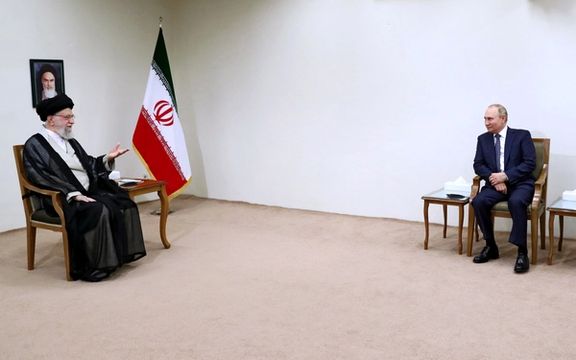
The effect of US Middle East policies – including in Syria, Iraq, Lebanon and Palestine – was becoming more limited, Khamenei said. The American presence in north-east Syria should end with their expulsion. President Ebrahim Raisi also referred to the US troop presence in Syria Tuesday to Iranian state television, arguing that it destabilized the country.
Cooperation between Moscow and Tehran would reach its “zenith” in the coming period, Khamenei said, stressing the need alongside other countries of continuing to expand trade away “step by step” from the dollar as the world “lost trust” in the US currency. Both Russia and China – whose dollarized bilateral trade fell below 50 percent in 2020 – are encouraging other countries to follow suit, including through groupings like the Shanghai Cooperation Organization (SCO), which Iran joined last year.
US ‘deceitful’
“Americans were both bullies and deceitful,” Khamenei said, as had been shown by their role in the dissolution of the Soviet Union, presumably in fostering nationalism in the Soviet republics.
Putin, IRNA reported, had said that while nobody wanted war, the West’s behavior had left the Kremlin “no choice but to react.” The Russian president said, according to IRNA, that some European countries had opposed talk of Ukraine joining Nato but had been cajoled by the US, revealing their lack of effective sovereignty.
The West did not consider Ukraine as a suitable candidate for NATO membership before the Russian invasion in February.
Putin described the US killing 2020 of Iranian general Qasem Soleimani “as another example of US evil.” He pointed out that sanctions against Russia over Ukraine had punished the west and others through higher energy prices and a food crisis.
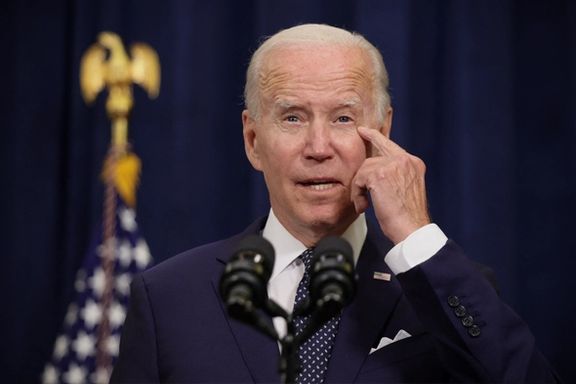
US President Joe Biden has issued an executive order to expand tools available to deter and disrupt hostage-taking and wrongful detentions of Americans.
Declaring a urgent need to deal with this threat, Biden on Tuesday authorized agencies to impose costs and consequences, including financial sanctions and visa bans, on malicious actors involved in hostage-taking, and charges agencies with developing new methods to deter hostage taking.
Foreign governments and human rights organizations have accused Iran of detaining foreigners and dual nationals on trumped up charges to use them for getting concessions from Western countries. US citizens Siamak Namazi and his father Baquer (Bagher) Namazi, Emad Shargi, and Morad Tahbaz and permanent resident Shahab Dalili are among the dual nationals or foreigners held in Iran on such charges. Iran also holds citizens of several countries including Germany, Austria, and Sweden, as de facto hostages.
In the executive order, known as Bolstering Efforts to Bring Hostages and Wrongfully Detained United States Nationals Home, Biden said “Terrorist organizations, criminal groups, and other malicious actors who take hostages for financial, political, or other gain — as well as foreign states that engage in the practice of wrongful detention, including for political leverage or to seek concessions from the United States.”
The US government must redouble its efforts at home and with partners abroad to deter these practices and to secure the release of those held as hostages or wrongfully detained, read the order.
“I therefore determine that hostage-taking and the wrongful detention of United States nationals abroad constitute an unusual and extraordinary threat to the national security, foreign policy, and economy of the United States,” he said.
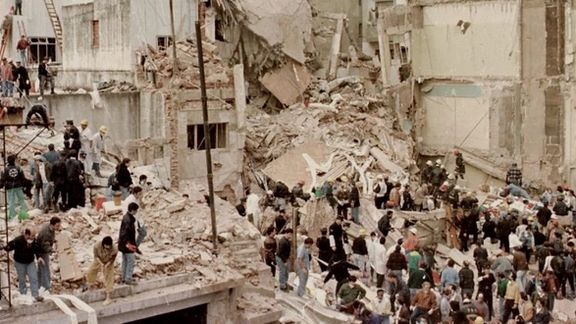
Some Argentinian and American officials have held Iran accountable on the anniversary of the 1994 AMIA bombing that killed 85 people and injured over 300.
July 18 marked the anniversary of the bombing of the Asociación Mutual Israelita Argentina (AMIA), a Jewish community center in Buenos Aires in Argentina and the 2012 attack on a tour bus in Burgas, Bulgaria, carrying Israeli tourists, both blamed on Iran-backed Lebanese group Hezbollah with direct involvement of high-level Iranian government officials.
State Department Spokesperson Ned Price said in a statement on Monday that the two heinous Hezbollah attacks were carried out with Iranian support, describing it as “the single deadliest antisemitic attack in more than half a century.”
“The AMIA bombing underscored Hezbollah’s global ambitions and is a clear example of Iran’s support of international terrorism,” he said, adding “While no one responsible for the attack has been brought to justice, the United States believes all Argentines deserve to have those responsible held accountable for this despicable and cowardly attack.”
He also referred to the 2012 attack on a tour bus in Burgas, Bulgaria, carrying Israeli tourists, saying Hezbollah murdered five Israeli tourists and a Bulgarian bus driver in the bomb attack, which also injured 45 Israeli youth traveling on the bus. “While Bulgarian courts convicted two Hizballah operatives in absentia in connection with the bombing, justice has yet to be served.”
“The United States is committed to countering Hezbollah and Iran’s malign influence. The funding, training, weapons, and other support Iran provides Hezbollah support complex and heinous terrorist attacks like these,” Price said. “The callous murder of civilians must not stand.”
He also referred to “national level designations, bans, or other restrictions against Hezbollah,” urging “more countries to take similar measures, which make it harder for the group and its backers in Tehran to threaten peace and security around the globe.”
Echoing Price’s remarks, US Special Envoy to Monitor and Combat Antisemitism Deborah Lipstadt, who is in Argentina on the anniversary of the event, reaffirmed the US support of Argentine Jews in "seeking accountability for the horrific actions of that day."
At the ceremony remembering the victims of the attack, AMIA president, Amos Linetzky, said "How can so much impunity be explained? The AMIA incident is one of the most shameful events in Argentine history" and is "an image that shows us to (have experienced) a humiliating failure."
As Argentina commemorated the 28th anniversary of the bomb attack on Monday, the country’s authorities demanded justice, given that nobody has ever been arrested for the attack.
They also called for greater efforts against "the terrorist threat" to the region, referring to a Venezuelan-Iranian jet that has been impounded in Argentina over links with the Revolutionary Guard.
Iran has denied that a Boeing 747 belongs to Iran’s Mahan Airlines -- sanctioned by the US in 2008 for its links to Tehran’s extraterritorial intelligence and secret ops outfit, the IRGC’s Quds (Qods) Force, but there are reports that at least one of the Iranian crew of the grounded Venezuelan cargo plane was a member of the Revolutionary Guards' Quds Force.
Among the Iranians on board is Gholamreza Ghasemi, who apparently was the pilot and is a member of the IRGC and a former board member of Fars Air Qeshm accused of transporting weapons for Hezbollah during the civil war in Syria. He is reportedly a relative of current Interior Minister Ahmad Vahidi, whose assignment by President Ebrahim Raisi triggered condemnation from Argentina given his suspected role in the AMIA bombing.